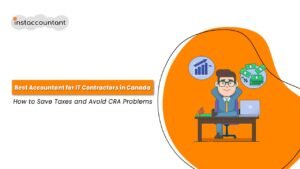As an electrician in Canada, you know that every dollar counts! Did you know that many electricians, whether sole proprietors or incorporated contractors, miss out on valuable tax deductions simply due to a lack of awareness? Maximizing these deductions can significantly boost your overall profitability.
In this guide, we’ll break down the most beneficial tax deductions available to electricians in Canada. You’ll learn how to identify eligible expenses, claim them correctly, and follow expert tips to ensure compliance with CRA regulations. Plus, incorporated electricians will find tailored advice to fully leverage their business structure.
Why Tax Deductions Matter for Electricians
Not understanding your eligible deductions can cost you thousands of dollars each year. By properly tracking your expenses and knowing how to file your claims, you can:
- Lower Your Taxable Income: Every deduction reduces the amount of income that is subject to tax, which can significantly decrease your overall tax bill.
- Free Up Cash Flow: By maximizing your deductions, you can retain more cash in your business, allowing you to reinvest in tools, marketing, or other growth opportunities.
- Reduce the Risk of Audits: Keeping accurate records and filing CRA-compliant claims minimizes the likelihood of audits and ensures you’re prepared if one occurs.
10 Beneficial Tax Deductions for Electricians in Canada
1. Tools and Equipment Deduction
Electricians often purchase tools and specialized equipment essential for their work. The Canada Revenue Agency (CRA) allows deductions for tools as follows:
- Tools over $500: These are considered capital expenses and must be depreciated over several years.
- Tools under $500: These can be claimed as immediate expenses.
How to Claim:
- Keep receipts and classify tools for depreciation if over $500.
- For tools under $500, list them as business expenses on your T2125 form.
- For incorporated electricians, claim these under your corporate tax return (T2).
Tips:
- Use the CRA’s Tradesperson’s Tool Deduction if you’re employed and bought tools out-of-pocket.
- Track all tool expenses using bookkeeping apps like Zoombooks.
2. Vehicle Expenses
Electricians traveling between job sites or transporting heavy equipment can claim vehicle expenses. Deductible costs include fuel, insurance, maintenance, and depreciation.
How to Claim:
- Sole proprietors report your vehicle expenses on the T2125 form.
- Incorporated electricians should have the company own the vehicle and claim costs under corporate expenses.
- If using a personal vehicle, calculate the business-use percentage (mileage tracking is essential).
Tips:
- Use apps like MileIQ to track mileage accurately.
- Avoid claiming 100% of vehicle use unless the vehicle is exclusively for business.
3. Home Office Deduction
If you use a portion of your home for administrative tasks like invoicing or scheduling, you may qualify for the home office deduction.
How to Claim:
- Calculate the percentage of your home’s square footage used for business.
- Deduct expenses like utilities, rent/mortgage interest, and internet.
- Sole proprietors claim this on T2125, while incorporated electricians claim reimbursement from their company.
Tips:
- Ensure the space is used exclusively for business to avoid CRA disputes.
- Maintain accurate records of utility and property costs.
4. Professional Development and Licensing Fees
Electricians are required to renew certifications, take courses, or pay union dues. These costs are fully deductible.
How to Claim:
- Report certification fees and memberships as professional fees in your tax return.
- Incorporated electricians can expense these under professional development costs.
Tips:
- Keep documentation for all certifications, courses, and related expenses.
- Check if your employer reimburses any fees; only unreimbursed costs are deductible.
5. Business Insurance
Liability insurance is essential for electricians to protect against potential lawsuits or damages.
How to Claim:
- Deduct premiums for business liability or tool insurance as business expenses.
- Incorporated electricians should file this as a corporate expense.
Additional Coverage Options:
- Professional Liability Insurance: This covers claims related to negligence or failure to deliver services as promised, which is crucial for electricians who provide design or consulting services.
- Tools and Equipment Insurance: Protects your tools and equipment against theft or damage, which can be a significant financial loss.
Tips:
- Combine this with vehicle insurance for better rates and streamlined deductions.
- Review your coverage annually to ensure it’s comprehensive.
6. Advertising and Marketing
From flyers to online ads, marketing expenses are deductible. This includes maintaining a professional website, paying for Google Ads, and other promotional activities.
How to Claim:
- Report all advertising costs on the T2125 form for sole proprietors or as a corporate expense for incorporated electricians.
Tips:
- Leverage digital platforms for cost-effective marketing.
- Save receipts for software subscriptions like Canva or social media ads.
7. Work Clothing and Safety Gear
Specialized clothing such as steel-toe boots, helmets, and fire-resistant gear is deductible for electricians, as these items are essential for safety and compliance on the job.
How to Claim:
- Report these expenses under “supplies” on the T2125 form for sole proprietors or as corporate deductions for incorporated electricians.
Tips:
- Ensure items are strictly for work and not for personal use.
- Label receipts to distinguish work clothing from general apparel.
8. Depreciation of Large Assets
Expensive assets like heavy machinery or vehicles depreciate over time and can be claimed annually under capital cost allowance (CCA).
How to Claim:
- Classify large assets under relevant CRA asset classes (e.g., vehicles as Class 10).
- Incorporations deduct these under CCA in the T2 return.
Tips:
- Consult an tax accountant to maximize depreciation benefits.
- Keep a detailed log of purchase dates and costs.
9. Bank Fees and Interest
Electricians using business accounts or loans for operations can deduct associated fees and interest payments.
How to Claim:
- Include fees from business accounts, credit cards, or loans in your tax return.
- For incorporated businesses, ensure accounts are under the company’s name.
Tips:
- Use a dedicated business account to simplify tracking.
- Avoid commingling personal and business finances.
10. GST/HST Rebates
If registered for GST/HST, electricians can claim input tax credits (ITCs) on business expenses.
How to Claim:
- Submit GST/HST returns quarterly or annually, including ITCs for eligible expenses.
Tips:
- Keep receipts for all GST/HST-inclusive purchases.
- Use Zoombooks to track ITCs and avoid missing deductions.
Key Tax Benefits for Incorporated Electricians
Salary vs. Dividends
Incorporation allows you to pay yourself a mix of salary and dividends, which can optimize tax savings. This strategy can help you manage your personal tax liability more effectively, as dividends are typically taxed at a lower rate than salary.
Additional Deductions
Incorporated electricians can claim a variety of expenses, including:
- Legal and Incorporation Fees: Costs associated with setting up and maintaining your corporation.
- Accounting and Tax Preparation Costs: Fees paid to accountants or tax professionals for services related to your business.
- Rent for Business Premises: If you rent space for your operations, this expense is fully deductible.
Tax Rate Benefits
Incorporation provides access to lower corporate tax rates, particularly under the Small Business Deduction. This deduction applies to the first $500,000 of active business income, allowing you to benefit from significantly reduced federal tax rates (as low as 9%) compared to personal income tax rates, which can be much higher, especially for higher income brackets.
How to Ensure CRA Compliance
- Use bookkeeping apps like Zoombooks to track expenses and invoices.
- Avoid overstating personal use for vehicle or home office deductions.
- An accountant specializing in electricians can help you maximize deductions while avoiding costly mistakes.
Ready to Save More?
Claiming tax deductions requires accurate record-keeping and a clear understanding of CRA rules. With the right strategy, you can reduce your tax burden and reinvest in your business. Don’t wait until tax season—start optimizing your finances today!
Would you like guidance on registering your business, tracking expenses, or managing your taxes as an electrician in Canada? As someone who understands the unique challenges you face, we’re here to help. Let’s connect and simplify the process together!




